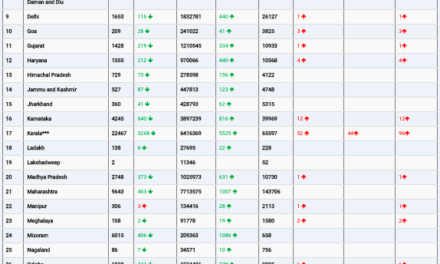New Delhi– A groundbreaking study published in the March 2025 edition of The Lancet Global Health suggests that improved nutrition could significantly curb India’s tuberculosis (TB) epidemic, potentially preventing over 350,000 deaths by 2035. Researchers estimate that providing a modest food basket and vitamin supplements to half of all TB patients and their families could avert approximately 880,700 TB cases and 361,200 deaths between 2023 and 2035.
The study proposes a food support package consisting of 1,200 calories for patients and 750 calories for each household contact. This intervention, estimated to cost $1.3 billion (around Rs 11,122 crore), is deemed highly cost-effective and underscores the crucial role of nutrition in standard TB care.
“People with TB and their households are often a marginalised group, frequently already experiencing food insecurity and exposed to further harm by the presence of TB disease,” said Finn McQuaid, an associate professor at the London School of Hygiene & Tropical Medicine (LSHTM) and study co-author.
Rebecca Clark, a Research Fellow at LSHTM and co-author, emphasized the potential impact of these findings on policy decisions. “International and national decision-makers could use our findings to advocate for better, as well as more targeted and relevant, interventions when it comes to support for TB patients and their families.”
India, despite recent declines in TB figures, still bears the world’s highest TB burden. The National Tuberculosis Elimination Programme (NTEP) has reported a decrease in incidence rates from 237 cases per million people in 2015 to 195 in 2023, and a reduction in TB-related deaths from 28 to 22 per million people.
However, a separate study published in Clinical Infectious Diseases paints a concerning picture of rising drug resistance. Researchers found that over one-third of patients previously treated with bedaquiline, a key TB drug, had developed resistance. Among 117 patients across clinics in Delhi and Mumbai, 42 showed resistance, with nearly 90% experiencing poor treatment outcomes, including death and treatment failure.
This growing resistance poses a significant threat, especially as India scales up newer all-oral drug regimens that rely heavily on bedaquiline. The study highlights the urgent need for timely drug-susceptibility testing to prevent the spread of resistant strains and ensure effective treatment.
The combined findings emphasize the multifaceted nature of combating TB in India, requiring both nutritional support and vigilant monitoring of drug resistance.
Disclaimer: The information provided in this article is based on the research findings as described. It should not be taken as definitive medical advice. Readers are advised to consult with healthcare professionals for any health concerns or before making any decisions related to their health or treatment. The studies referenced are subject to peer review and further validation. The cost estimates provided are based on the study’s projections and may vary. The situation concerning drug resistance is evolving and requires ongoing monitoring and research.












